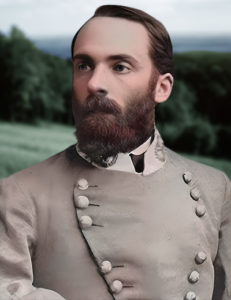
Joseph Wheeler High School is named after Joseph Wheeler, a prominent military figure in American history, known for his service to the Confederacy during the Civil War and the United States during the Spanish-American War. Born on September 10, 1836, in Augusta, Georgia, Wheeler dedicated a significant portion of his life to military service.
Wheeler attended the United States Military Academy at West Point, graduating in 1859. With the outbreak of the Civil War in 1861, he resigned from the U.S. Army and joined the Confederate States Army. Throughout the war, Wheeler distinguished himself as a skilled cavalry commander, earning the nickname “Fighting Joe” for his bravery and tactical abilities on the battlefield.
“Fighting Joe” Wheeler participated in numerous Civil War engagements on the side of the Confederacy, including the Battles of Shiloh, Perryville, Stones River, Chickamauga, and Atlanta. His leadership and strategic maneuvers were instrumental in several Confederate victories. Wheeler’s cavalry raids disrupted Union supply lines and communication networks, causing significant disruption to the Union Army’s operations.
After the Civil War, Wheeler resumed his civilian life and pursued a career in politics. He served multiple terms in the U.S. House of Representatives, representing Alabama as a Democrat. During this time, he advocated for the rights of veterans and became known for his passionate speeches in Congress.
In 1898, during the Spanish-American War, Wheeler, now in his early sixties, returned to military service as a brigadier general in the U.S. Army. He commanded a cavalry unit known as the “Rough Riders,” alongside Colonel Theodore Roosevelt. Wheeler’s leadership and combat experience contributed to the success of the American forces during the war.
Joseph “Fighting Joe” Wheeler’s military career spanned both the Confederate and U.S. armies, leaving his mark on American military history. Wheeler’s legacy as a skilled cavalry commander and public servant for both the U.S. and the Confederacy remains a part of American military history.
On Honoring a Confederate Leader
The question of whether it is acceptable to honor Confederate army leaders is a complex and sensitive issue that elicits diverse viewpoints. The Confederacy fought to preserve the institution of slavery, which is widely regarded as a grave injustice and a dark chapter in American history. As such, honoring Confederate leaders can be seen as endorsing or celebrating a cause rooted in oppression and discrimination.
Many argue that commemorating Confederate leaders perpetuates a painful legacy and represents a symbol of racism, inequality, and white supremacy. It can cause deep pain and distress for individuals and communities who have experienced the enduring effects of slavery and racial discrimination.
Conversely, some individuals argue that honoring Confederate leaders is part of acknowledging and preserving our historical heritage and recognizing the complexities of the past. They contend that such recognition does not necessarily endorse the Confederacy’s ideals, but rather seeks to understand the historical context and learn from the mistakes of the past.
The subject of honoring Confederate leaders is an ongoing and evolving conversation in society. It is influenced by shifting societal values, cultural perspectives, and an evolving understanding of history. Different communities and individuals hold divergent opinions on this matter, and debates surrounding the removal or retention of Confederate monuments, the renaming of buildings, and the teaching of history continue to be significant points of contention.
Ultimately, discussions about honoring Confederate leaders involve considerations of historical context, moral values, and the impact on marginalized communities. It is essential to engage in respectful and empathetic dialogue, taking into account a wide range of perspectives, and striving towards a more inclusive and equitable society.



